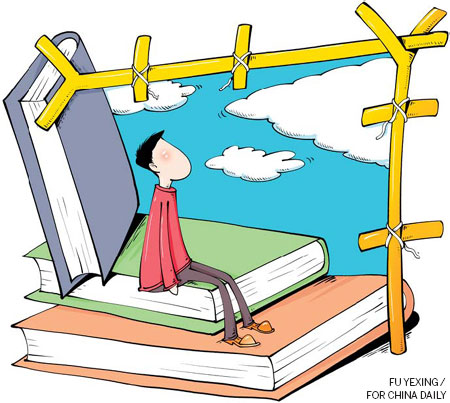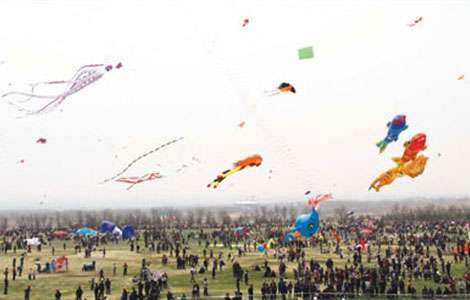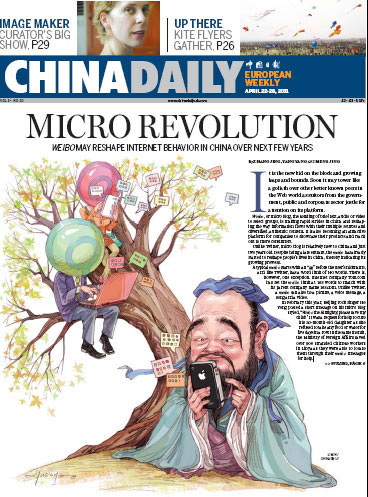It takes two to tango for progress
Updated: 2011-04-29 10:50
By Shada Lslam (China Daily European Weekly)
European think tanks must find ways for China and Europe to face global challenges together
These are busy days for China specialists in the European Union. As China rises, so does the demand for more information, analysis and insight into the mysteries of Asia's economic powerhouse. And with China's global influence expected to expand further in the coming years, Europe's interest in what makes the country tick will keep getting stronger.
This is good news for the many European think tanks and research institutes devoted to the study of modern-day China. But keeping up with developments in the country is no easy task.
For one, China moves fast. It may be the world's second largest economy, but it is still a developing country struggling to meet the basic needs of large swathes of the population.
Second, despite the hype about building a strategic EU-China relationship, the reality is different: Ties between the two sides remain awkward, uncertain and subject to sudden ups and downs. In the last 25 years, I have watched Beijing and Brussels go through a short but intense honeymoon period in 2004, disagreements over Tibet and human rights in 2008, followed by current sporadic efforts to kiss and make-up.
This is hardly surprising. Periods of global change and transition, as new powers rise and old ones struggle to stay on course, are invariably tense and difficult. It is easy to get lost in accusations and counter-accusations over the value of the Chinese currency, problems over protecting intellectual property rights, China's military expenditure and Beijing's relations with its Asian neighbors.
The emerging consensus, backed by some European think tanks, appears to be that rising China is in a confrontational mood and that this requires an equally tough response from Europe.

Such a conclusion certainly satisfies public hunger for easy answers in a complicated world. However, it misses the complex reality of rising China. It also fails to take account of the wider geopolitical changes under way as emerging powers challenge older ones and the over-arching fact that, whether they like it or not, policymakers in Europe and America will have to get used to living in a multipolar world.
If they are to perform their role as original and innovative centers of reflection and analysis, European think tanks face the challenge of looking beyond current quarrels and misunderstandings to ways in which China and Europe can work together to deal with global challenges.
That's the challenge that Friends of Europe's newly launched Asia program has set for itself. The program, seeking to "make sense of the Asian century", does not ignore the areas of dissent and discord. But we believe that whether it is climate change, nuclear non-proliferation or energy and food security, no modern-day global problem, no international challenge can be tackled without consulting and cooperating with China. EU-China inter-dependence has been further strengthened by China's promise to be a "committed and sustained" investor in European debt.
We also believe that at the start of the second decade of 21st century, Europe and China should discard past clichs and take a fresh look at each other. The challenge is to put relations on a solid, sustained basis so that points of discord and friction are dealt with in a rational manner and do not poison the overall relationship. Expectations have to be managed on both sides.
Differences over values, norms and interests between the EU and China will not disappear any time soon. But progress in the relationship on other fronts should not be allowed to become a hostage to such discord.
These issues as well as the complexities of the Chinese economy are also dealt with in Friends of Europe's Understanding China program which looks at Beijing's domestic reform efforts, regulatory changes and environmental and energy security priorities. One of the key objectives is to identify the challenges and opportunities facing European companies as they seek to invest, export or set up business joint ventures with Chinese companies.
Not surprisingly, the 12th Five-Year Plan (2011-2015) and its potential for greater EU-China cooperation have taken center stage. A recent study on Greening China: Outlook for European SMEs published as part of the Understanding China program, points out that the new Chinese economic blueprint offers EU companies a unique opportunity to participate in the greening of China. But it also warns that the EU should be braced for more competition from Chinese rivals and new investment restrictions in the low-carbon sector.
But let's be frank: No outsider can really fully understand China. The best we can do is to attempt to decipher the country's many complex realities. And to do this, we have to keep talking to each other.
The author is head of the Asia program at Friends of Europe, Brussels.
E-paper

Blowing in the wind
High-Flyers from around the world recently traveled to home of the kite for a very special event.
Preview of the coming issue
Image maker
Changing fortunes
Specials

British Royal Wedding
Britain's Prince William and his girlfriend Kate Middleton get married on April 29.

Costly dream
Uninhabited havens up for lease but potential customers face wave of challenges in developing them.

Models gear up car sales
Beauty helps steer buyers as market accelerates.
